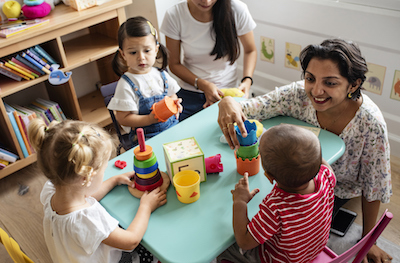If you have a toddler who will enter a structured child care program for the first time, he or she may experience some separation anxiety. If so, that’s perfectly normal. Fortunately, there are ways to make this transition easier.
For example, it can help if you can ease your child into the program. If it works for your family, you could start out by having your toddler go to the child care center three days a week, rather than immediately into full-time care. As your toddler gets used to the program, then you can increase attendance.
Make sure your child gets plenty of rest each night, with a regular bedtime that reinforces a sense of familiarity and security. Also make sure that you include enough time for your toddler to go through typical morning routines without needing to rush through breakfast or bath time.
When you’re dropping your toddler off, don’t drag out the process. Although it can be tempting to stay a while, especially if your child is crying, it typically makes it worse when you linger — perhaps even adding to your child’s sense of separation anxiety. Instead, establish regular morning routines, perhaps a hug and a cheerful goodbye, and then stick to that routine.
If separation anxiety appears to be a significant issue for your toddler, but then the caregiver says he or she calms down once you’re gone, it might be time to experiment. Try arranging to have someone else take your toddler to child care for a few days to see what happens at drop-off time. You may find that the fussing stops, which can give you insight into your child’s behavior.
One possible solution, if your child fusses for you but not when someone else drops him or her off, is to let your toddler take a familiar item to child care. For example, if the two of you read books together at bedtime, let your toddler take a favorite to the child care center. Or your child might feel comforted if he or she has a family picture at the center. Be sure to ask the caregivers what items your toddler can bring.
An additional tip to prepare for child care includes building a relationship with the people who will care for your toddler. Your child will watch how you interact with the caregivers, and when he or she sees positive interaction, that can help.
Plus, when you develop this relationship, you’ll form an important partnership that will help your toddler get the best care possible and create the foundation for his or her early education. You can share information about what your child likes and dislikes, how he or she eats, falls asleep and much more.
Fortunately, most toddlers adjust to their child care program. Don’t forget: It’s entirely possible that your child won’t have separation anxiety or will have a relatively mild case. Don’t assume that this is always a component of the experience.
Toddler Care at Horizon Education Centers
You can find information about our toddler child care programs at multiple locations. No matter which center is most convenient for you, you can count on a focus on:
- Physical Health Skills: Develop self-help skills (hand washing, feeding and potty training)
- Social and Emotional Development: Child-centered activities
- Motor Development: Active indoor/outdoor playtime
- Language and Communication Development: Early literacy and fine motor skills
- Cognitive Development: Problem solving, attention and memory skills
- Specially Designed Facilities: Self-contained classrooms, restrooms and play area
We maintain a 1:7 staff/child ratio, with care provided by qualified, trained, experienced, and nurturing staff and teachers. Plus, breakfast, lunch and snacks are served each day. Please contact Horizon Education Centers at 440-779-1930 with your questions.




